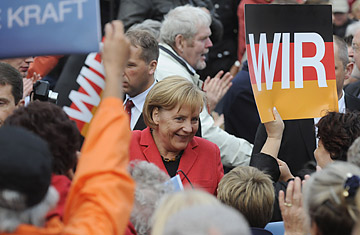
German Chancellor Angela Merkel greets well-wishers at an election rally in the northern German city of Heide.
It was a puzzling experience for German Chancellor Angela Merkel. At a rally last week in Hamburg, the leader of the Christian Democrats — and the expected winner of Sunday's national elections — gave her stock election speech, which usually elicits occasional rounds of polite applause. This time, however, every sentence was punctuated by loud cheers of "Yeah!" from a small part of the crowd. A similar thing happened in the city of Mainz three days later. Again, there were shouts of "Yeah!" following each line of Merkel's speech. Other people in the crowd repeated random words, such as fünf (five), Hintertür (backdoor) and Wachstum (growth).
Merkel had been the unwitting victim of a "flash mob," in which large crowds of mostly young people are drawn together by social or digital media to perform spontaneous and often absurd stunts. The irony-laden protest is as clear a sign as any that young, Internet-savvy Germans are feeling disenchanted with the major parties in the election, particularly in the wake of Barack Obama's startling run to the White House last year. Obama galvanized young voters with his use of the Internet and catchy slogans like "Yes We Can," but Merkel's CDU party and its main rival, the Social Democrats (SPD), have largely rejected new media in favor of safe, predictable and boring campaigning. Their candidates are void of charisma, their platforms are unimaginative and their slogans lack punch — "Our Country Can Do More," for instance, hardly excites. As a result, many young people feel as if they are being pushed away. "[The flash mobs] are an adequate response to parties that refuse to communicate," says Robin Meyer-Lucht, a Berlin-based media commentator and editor of the political website carta.info.
Of course, all the German parties initially said they wanted to run Obama-style campaigns and reach out to younger voters. The SPD, led by current Foreign Minister Frank-Walter Steinmeier, said the Internet would be "at the heart" of its campaign, but it has done little to show for it. For the past two months, Steinmeier (or, more likely, one of his staff members) has been blogging on the campaign's website, but few people seem to have noticed — the number of comments to his posts are usually in the single digits. A former SPD party member told the Der Freitag newspaper on Thursday that "too much 'community,' too much openness was deemed too risky" by the campaign. "You're unable to control the press, so how can you keep a grip on ... all those bloggers, Twitterers and chatters out there?" the unnamed worker said.
While Merkel has popular profile pages on Facebook and the German social-networking site Studivz.net, the CDU has done next to nothing with its own party website. It is certainly not using the site to reach out to new members or to engage young voters in the issues. "It's amazing how the parties willfully ignore what people want to talk about," says Clay Risen, managing editor of the U.S.-based Democracy journal and currently a fellow at Berlin's Tagesspiegel newspaper. "The Obama campaign used the Internet not only as a message machine, but also to involve people." Some analysts believe the party websites may even be just for show. "The online campaigns exist in part so the parties can present themselves to journalists as modern," Meyer-Lucht says. "I expect that many of those ill-understood instruments will be stored away once the elections are over."
It's no wonder that young people are turning their backs on the major parties. Many are instead supporting fringe parties not represented in the Bundestag, such as the two-year-old Pirate Party, whose platform is centered on ending censorship on the Internet. The party's online popularity is evident on Studivz.net, where its profile page has 75,000 fans, compared to only 72,000 fans for Merkel's page and a paltry 21,000 for Steinmeier. "They are the biggest phenomenon [of the campaign]," says Markus Berger-de Léon, the head of VZnet Netzwerke, the company that runs Studivz.net.
The Pirate Party is highly unlikely to pass the 5% vote threshold necessary to win a seat in parliament this year. But the major parties better watch out or the Pirates — and other Internet-savvy groups — may just hijack the political process next time around.
